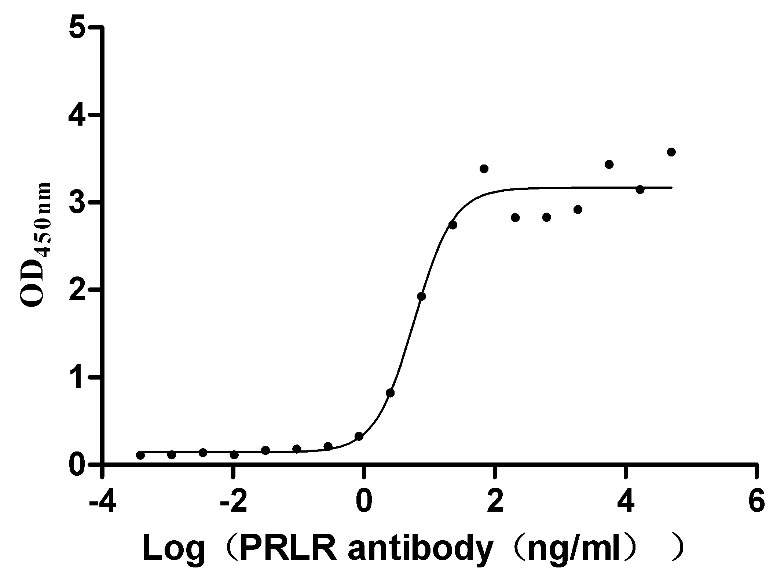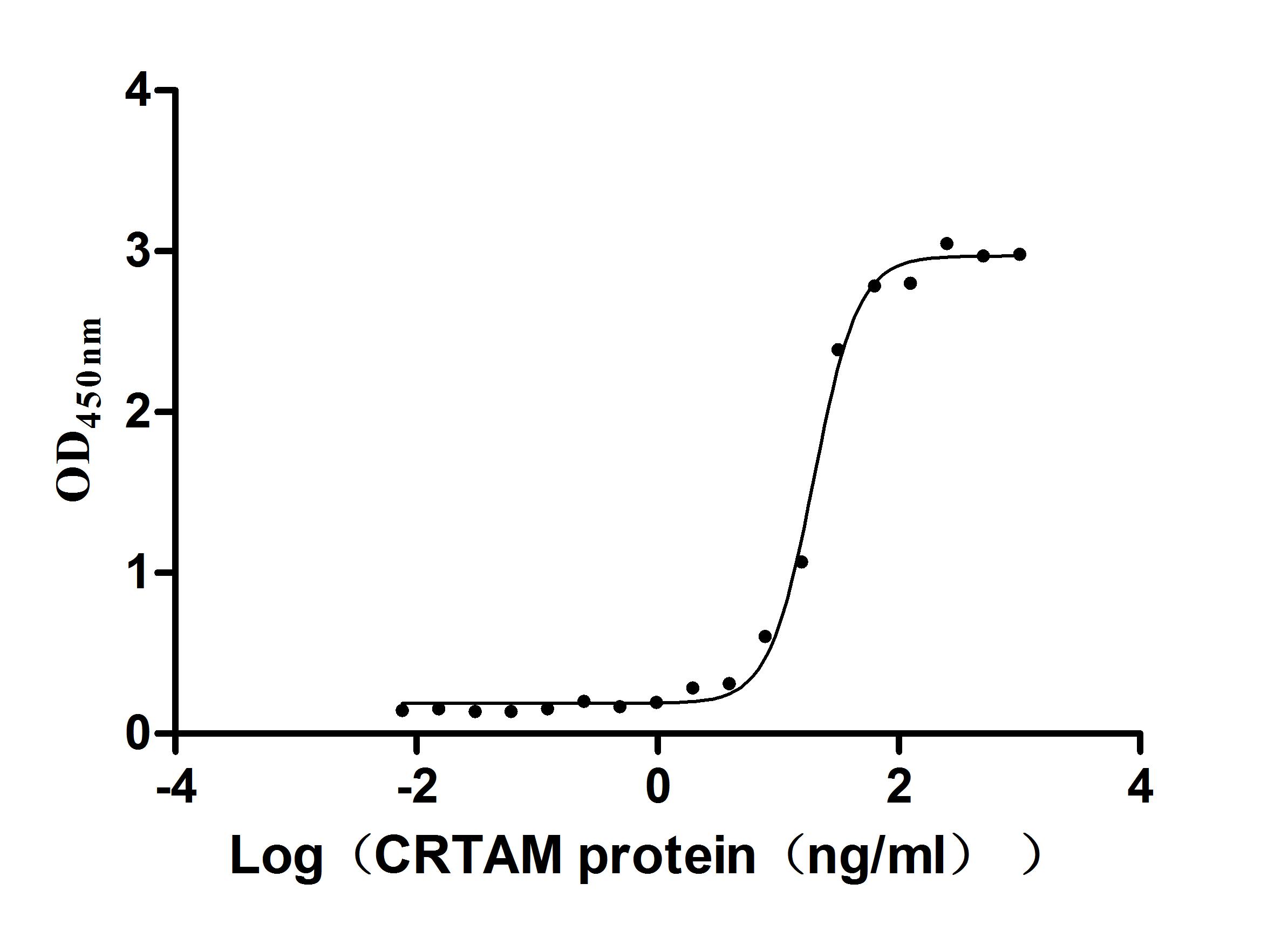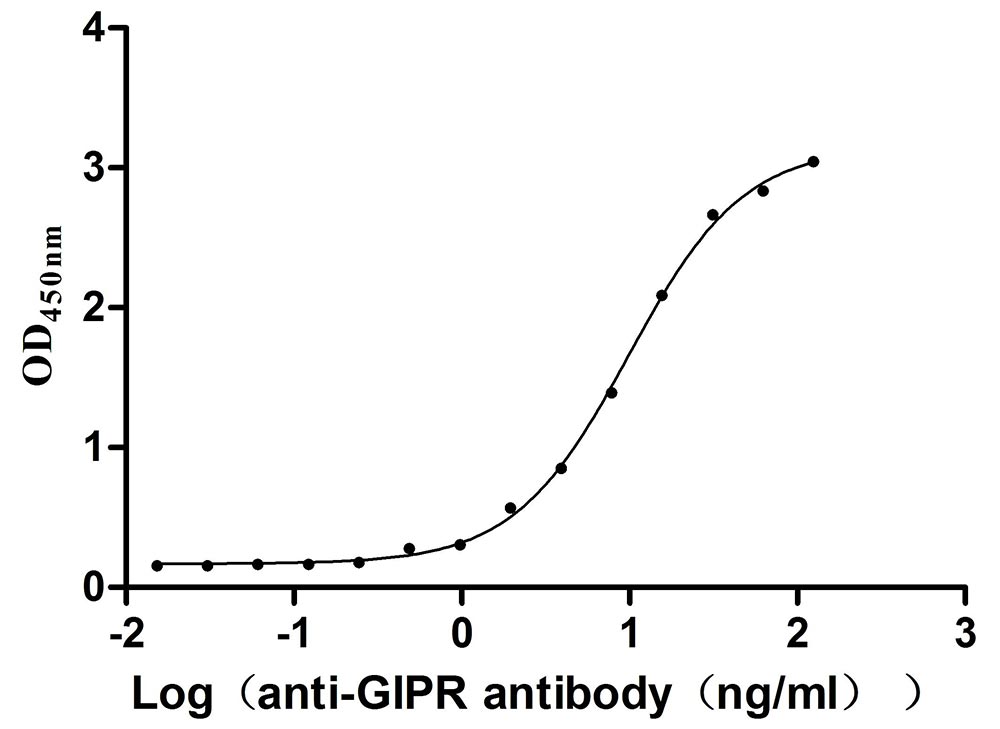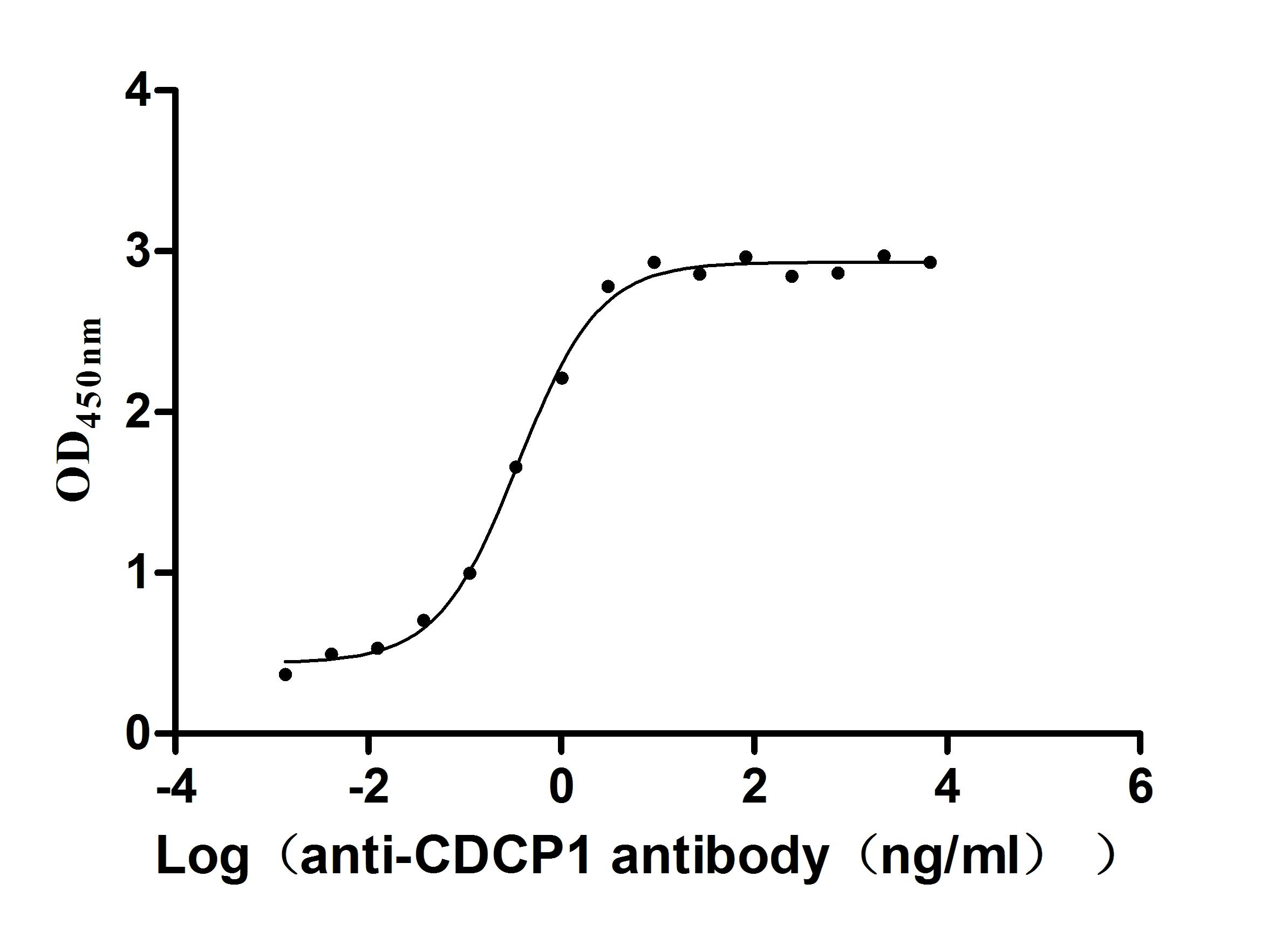Recombinant Mouse Toll-like receptor 4 (Tlr4), partial
-
货号:CSB-EP023603MO
-
规格:
-
来源:E.coli
-
其他:
-
货号:CSB-EP023603MO-B
-
规格:
-
来源:E.coli
-
共轭:Avi-tag Biotinylated
E. coli biotin ligase (BirA) is highly specific in covalently attaching biotin to the 15 amino acid AviTag peptide. This recombinant protein was biotinylated in vivo by AviTag-BirA technology, which method is BriA catalyzes amide linkage between the biotin and the specific lysine of the AviTag.
-
其他:
-
货号:CSB-BP023603MO
-
规格:
-
来源:Baculovirus
-
其他:
-
货号:CSB-MP023603MO
-
规格:
-
来源:Mammalian cell
-
其他:
产品详情
-
纯度:Greater than 90% as determined by SDS-PAGE.
-
基因名:
-
Uniprot No.:
-
别名:Tlr4; Lps; Toll-like receptor 4; EC 3.2.2.6; CD antigen CD284
-
种属:Mus musculus (Mouse)
-
蛋白长度:Partial
-
分子量:71.5kDa
-
蛋白标签:Tag type will be determined during the manufacturing process.
The tag type will be determined during production process. If you have specified tag type, please tell us and we will develop the specified tag preferentially. -
产品提供形式:Lyophilized powder
Note: We will preferentially ship the format that we have in stock, however, if you have any special requirement for the format, please remark your requirement when placing the order, we will prepare according to your demand. -
复溶:We recommend that this vial be briefly centrifuged prior to opening to bring the contents to the bottom. Please reconstitute protein in deionized sterile water to a concentration of 0.1-1.0 mg/mL.We recommend to add 5-50% of glycerol (final concentration) and aliquot for long-term storage at -20℃/-80℃. Our default final concentration of glycerol is 50%. Customers could use it as reference.
-
储存条件:Store at -20°C/-80°C upon receipt, aliquoting is necessary for mutiple use. Avoid repeated freeze-thaw cycles.
-
保质期:The shelf life is related to many factors, storage state, buffer ingredients, storage temperature and the stability of the protein itself.
Generally, the shelf life of liquid form is 6 months at -20°C/-80°C. The shelf life of lyophilized form is 12 months at -20°C/-80°C. -
货期:Delivery time may differ from different purchasing way or location, please kindly consult your local distributors for specific delivery time.Note: All of our proteins are default shipped with normal blue ice packs, if you request to ship with dry ice, please communicate with us in advance and extra fees will be charged.
-
注意事项:Repeated freezing and thawing is not recommended. Store working aliquots at 4°C for up to one week.
-
Datasheet :Please contact us to get it.
相关产品
靶点详情
-
功能:Cooperates with LY96 and CD14 to mediate the innate immune response to bacterial lipopolysaccharide (LPS). Acts via MYD88, TIRAP and TRAF6, leading to NF-kappa-B activation, cytokine secretion and the inflammatory response. Also involved in LPS-independent inflammatory responses triggered by free fatty acids, such as palmitate. In complex with TLR6, promotes sterile inflammation in monocytes/macrophages in response to oxidized low-density lipoprotein (oxLDL) or amyloid-beta 42. In this context, the initial signal is provided by oxLDL- or amyloid-beta 42-binding to CD36. This event induces the formation of a heterodimer of TLR4 and TLR6, which is rapidly internalized and triggers inflammatory response, leading to the NF-kappa-B-dependent production of CXCL1, CXCL2 and CCL9 cytokines, via MYD88 signaling pathway, and CCL5 cytokine, via TICAM1 signaling pathway, as well as IL1B secretion. Binds electronegative LDL (LDL(-)) and mediates the cytokine release induced by LDL(-). Activated by the signaling pathway regulator NMI which acts as damage-associated molecular patterns (DAMPs) in response to cell injury or pathogen invasion, therefore promoting nuclear factor NF-kappa-B activation.
-
基因功能参考文献:
- intestinal epithelial TLR4 regulates metabolic syndrome through altered host-bacterial signaling PMID: 29363671
- These data suggest that targeting TLR TIR domains may provide novel pharmacological targets to reduce or reverse TLR4-dependent pain behavior in the rodent. PMID: 28623271
- We further show that EGFR is activated through toll-like receptor 4. Disruption of toll-like receptor 4 or the EGFR pathway led to reduced inflammatory activity and foam cell formation PMID: 28374780
- Bone marrow malfunction arises early in obesity and depends on precursor-intrinsic TLR4. PMID: 29453396
- Toxoplasma gondii ROP38 promotes the maturation of dendritic cells mediated by TLR4. PMID: 29773099
- Local inhibition of TLR4 and MyD88 might reduce immune responses and ameliorate allograft rejection. PMID: 28393847
- Results concluded that a hyperactive TLR4-NF-kappaB signal and higher level of cytokines are involved in susceptibility to depression in stressed obese mice. PMID: 29765402
- these data showed that TLR4 knockout ameliorated high fat diet-induced cardiac contractile and intracellular Ca(2+) anomalies through inhibition of inflammation and ROS, possibly through a NF-kappaB/JNK-dependent activation of autophagy. PMID: 28108421
- miR-711, which is upregulated by Adipoq, represses TLR4 signaling, acting therefore as a major mediator of the anti-inflammatory action of Adipoq. PMID: 28240307
- TLR4 expression in placenta is up-regulated during maternal murine cytomegalovirus infection. PMID: 30128872
- Loss of TLR4 in the mouse retinal Muller cells impaired insulin signal transduction. PMID: 29490521
- TREM-1 may play an important role together with TLR4 in the nasopharyngeal clearance of Haemophilus influenzae by neutrophils. PMID: 30055735
- TLR4-mediated p62 autophagic impairment plays an important role in the occurrence and development of neuropathic pain. PMID: 29486776
- atorvastatin treatment may protect BV2 microglia and hippocampal neurons from oxygenglucose deprivationinduced neuronal inflammatory injury by suppressing the TLR4/TRAF6/NFkappaB pathway. This may provide a potential strategy for the treatment of neuronal injury. PMID: 29845194
- these results suggest that TanIIA treatment is beneficial for improvement of Hypoxic ischemic encephalopathy through TLR4mediated NFkappaB signaling. PMID: 29956801
- Both pharmacologic inhibition and genetic knockout of TLR4 completely abolished mesenteric lymph (ML) exosome-induced cytokine production in macrophages. Our findings define the critical role of exosomes secreted into ML as a critical mediator of trauma/hemorrhagic shock-induced acute lung injury through macrophage TLR4 activation. PMID: 28855278
- Fusobacterium nucleatum infection increased M2 polarization and intestinal tumour growth in ApcMin/+ mice and was TLR4dependent. PMID: 30121899
- TLR4 plays a regulatory role in the type 1 immune responses during C. sinensis infection, controlling release of Th1/Th2 cytokines by infected splenocytes and dendritic cells. PMID: 29047038
- This study demonstrates that the synergistic effect between TLR4 and TLR3 in macrophages is an important determinant in acute lung injury and, more importantly, that TLR3 up-regulation is dependent on TLR4-MyD88-NF-kappaB signaling. PMID: 28198368
- Toll-like receptor 4 (TLR4) requires physical and functional association with Fcalpha-mu protein (Fcalpha/muR) for its oligomer formation and interleukin-6 (IL-6) production from marginal zone (MZ) B cells. PMID: 27146354
- The expression of Toll-like receptor (TLR)4 and NF-kappaB p50 was also inhibited by Andro. Additionally, in vitro data confirmed that Andro treatment not only attenuated the expression of profibrotic and proinflammatory factors but also blocked the TGF-beta1/Smad2 and TLR4/NF-kappaB p50 pathways. PMID: 29743985
- CatH deficiency impaired toll-like receptor 3-mediated activation of interferon regulatory factor 3 and consequent secretion of IFN-beta PMID: 29470604
- TLR4(-/-) mice showed massive alpha-SYN protein accumulation and dopaminergic cell loss in substantia nigra. PMID: 29589201
- The results suggested that dioscin prevents LPSinduced ALI through inhibiting the TLR4/MyD88 signaling pathway via upregulation of HSP70. PMID: 29512786
- this study shows that endocytosis of particulate matter induces cytokine production by neutrophil via Toll-like receptor 4 PMID: 29522983
- Study showed the significance of TLR4 in upregulation of MAPK/ErK in NMDAR hypofunction schizophrenic-mouse model. This is characterized by a decrease in hippocampal IGF-1R/CaMKIIalpha, and social interaction behavioral deficits. Ultimately, hippocampal TLR4 knockdown rescued IGF-1R/CaMKIIalpha decline and prevented behavioral deficits by reducing MAPK/ErK expression. PMID: 29137928
- Study highlights the importance of Ca(2+) signaling in macrophage activation and identifies the ion channel TRPM7 as a central component of TLR4 signaling. PMID: 29343440
- The immunoenhancement effect of PSP against lung cancer is mediated by TLR4-MAPK/NF-kappaB signaling pathways PMID: 29343453
- knockout of TLR4 gene improved survival and cardiac function in severe sepsis induced by CLP by decreasing the myocardial levels of inflammatory cytokines, weakening neutrophil infiltration in myocardium, and attenuating the heart apoptosis. PMID: 29393431
- beta-arrestin 2 can protect liver tissue from LPS-induced injury via inhibition of TLR4/NF-kappaB signaling pathway-mediated inflammation. PMID: 29375207
- TLR4 mutation can decrease the expression of inflammatory factors and enhance the speed of recovery after sciatic nerve injury. PMID: 29227824
- Toll-like receptor (TLR) 4, the expression of which was upregulated in B cells after ultraviolet B exposure, played an essential role in the induction of regulatory B cells. PMID: 29205369
- Pudilan xiaoyan oral liquid prevents LPS-induced respiratory in fl ammation via effects on TLR4/NF-kappaB signaling. PMID: 28689797
- NOD2 Modulates Serotonin Transporter and Interacts with TLR2 and TLR4 in Intestinal Epithelial Cells PMID: 29913461
- The results demonstrated prolific RSV infection of N2a cells, which triggered a decrease of NeuN protein expression, coinciding with an increase of nuclear lesions, F protein expression, RSV viral titers, and late apoptotic levels of N2a cells. RSV infection induced co-localization of RSV F protein with TLR4 and nucleolin. PMID: 29427996
- These data suggest that neutrophil extracellular traps are generated in ventilator-induced lung injury (VILI) and pathogenic in a mouse model of VILI, and their formation is partially dependent on TLR4. PMID: 29387725
- this study shows that Toll-like receptor 4 deficiency increases resistance in sepsis-induced immune dysfunction PMID: 29149705
- In conclusion, the data support that TLR4 is involved in the insulin signaling pathway in the retina. PMID: 28681194
- this study shows that lipopolysaccharide)-mediated priming of TLR4 enhances oxidant-induced prostaglandin E2 biosynthesis in primary murine macrophages PMID: 29161659
- bone marrow transplantation between wild-type and TLR4 knockout mice revealed that hepatic TLR4-dependent hepcidin expression was comparable to macrophage TLR4-dependent hepcidin expression induced by LPS PMID: 29217822
- this study reveals a novel mechanism of naringenin through AMPK-ATF3-dependent negative regulation of the LPS/TLR4 signalling pathway, which thereby confers protection against murine endotoxaemia. PMID: 28004841
- These data demonstrate that the Pb18 strain of Paracoccidioides brasiliensis is able to activate the transcription of Notch1 receptor in J774 macrophages. Activation of this receptor with also activation of TLR 4 (via LPS) induces IL-6 production, which favors the pathogenesis. PMID: 28600728
- In human resistin-expressing transgenic mice and resistin prevents lipopolysaccharide (LPS)-induced mortality by blocking LPS binding to its receptor Toll-like receptor 4 (TLR4) and by promoting anti-inflammatory signaling. PMID: 29133417
- The findings of this study indicated that activation of the neuroimmune system and TLR4 signaling may possibly be involved in environmental pollutant-induced spatial learning impairment in neonatal mice. PMID: 29107071
- Ts-Hsp70 elicited protective immunity against T. spiralis infection was reduced in TLR2-/- and TLR4-/- mice correlating with the reduced humoral and cellular immune responses. PMID: 29775453
- Rosiglitazone Regulates TLR4 and Rescues HO-1 and NRF2 Expression in Myometrial and Decidual Macrophages in Inflammation-Induced Preterm Birth. PMID: 28322133
- TLR4 and NLRP3 are suppressed by alpinectin, which attenuates inflammation in DSS-induced acute colitis PMID: 27321991
- Subcutaneous injection of dendritic cells aggravates atherosclerosis in ApoE-knockout mice by activation of TLR4. PMID: 28849148
- Study shows that the disulfide form of high mobility group box-1 mediates bladder pain directly (not secondary to inflammation or injury) through activation of toll-like receptor 4 receptors in the bladder. PMID: 28545586
- ablation of TLR4 mitigates cardiac mitochondrial dysfunction in a model of HHcy PMID: 28738166
显示更多
收起更多
-
相关疾病:The protein is encoded by the Lps locus, an important susceptibility locus, influencing the propensity to develop a disseminated Gram-negative infection.
-
亚细胞定位:Cell membrane; Single-pass type I membrane protein. Early endosome. Cell projection, ruffle.
-
蛋白家族:Toll-like receptor family
-
组织特异性:Expressed in macrophages (at protein level). Highly expressed in heart, spleen, lung and muscle. Lower levels are found in liver and kidney.
-
数据库链接:
KEGG: mmu:21898
STRING: 10090.ENSMUSP00000045770
UniGene: Mm.38049
Most popular with customers
-
Recombinant Human UL16-binding protein 1 (ULBP1) (Active)
Express system: Mammalian cell
Species: Homo sapiens (Human)
-
Recombinant Human SARS coronavirus Spike glycoprotein (S), partial (Active)
Express system: Mammalian cell
Species: Human SARS coronavirus (SARS-CoV) (Severe acute respiratory syndrome coronavirus)
-
Recombinant Human T-cell surface protein tactile (CD96), partial (Active)
Express system: Mammalian cell
Species: Homo sapiens (Human)
-
Recombinant Human HLA class II histocompatibility antigen gamma chain (CD74), partial (Active)
Express system: Mammalian cell
Species: Homo sapiens (Human)
-
Recombinant Mouse Prolactin receptor (Prlr), partial (Active)
Express system: Mammalian cell
Species: Mus musculus (Mouse)
-
Recombinant Human Cell adhesion molecule 1 (CADM1), partial (Active)
Express system: Mammalian cell
Species: Homo sapiens (Human)
-
Recombinant Mouse Gastric inhibitory polypeptide receptor (Gipr), partial (Active)
Express system: Mammalian cell
Species: Mus musculus (Mouse)
-
Recombinant Human CUB domain-containing protein 1 (CDCP1), partial (Active)
Express system: Mammalian cell
Species: Homo sapiens (Human)


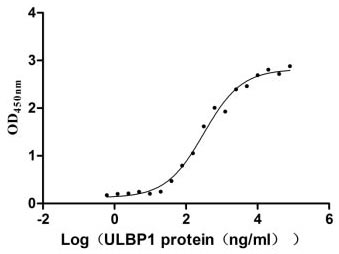
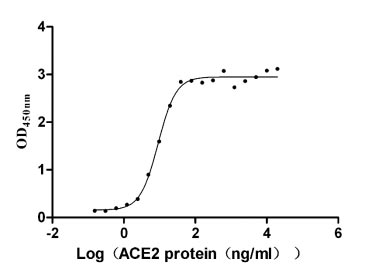
-AC1.jpg)
-AC1.jpg)
